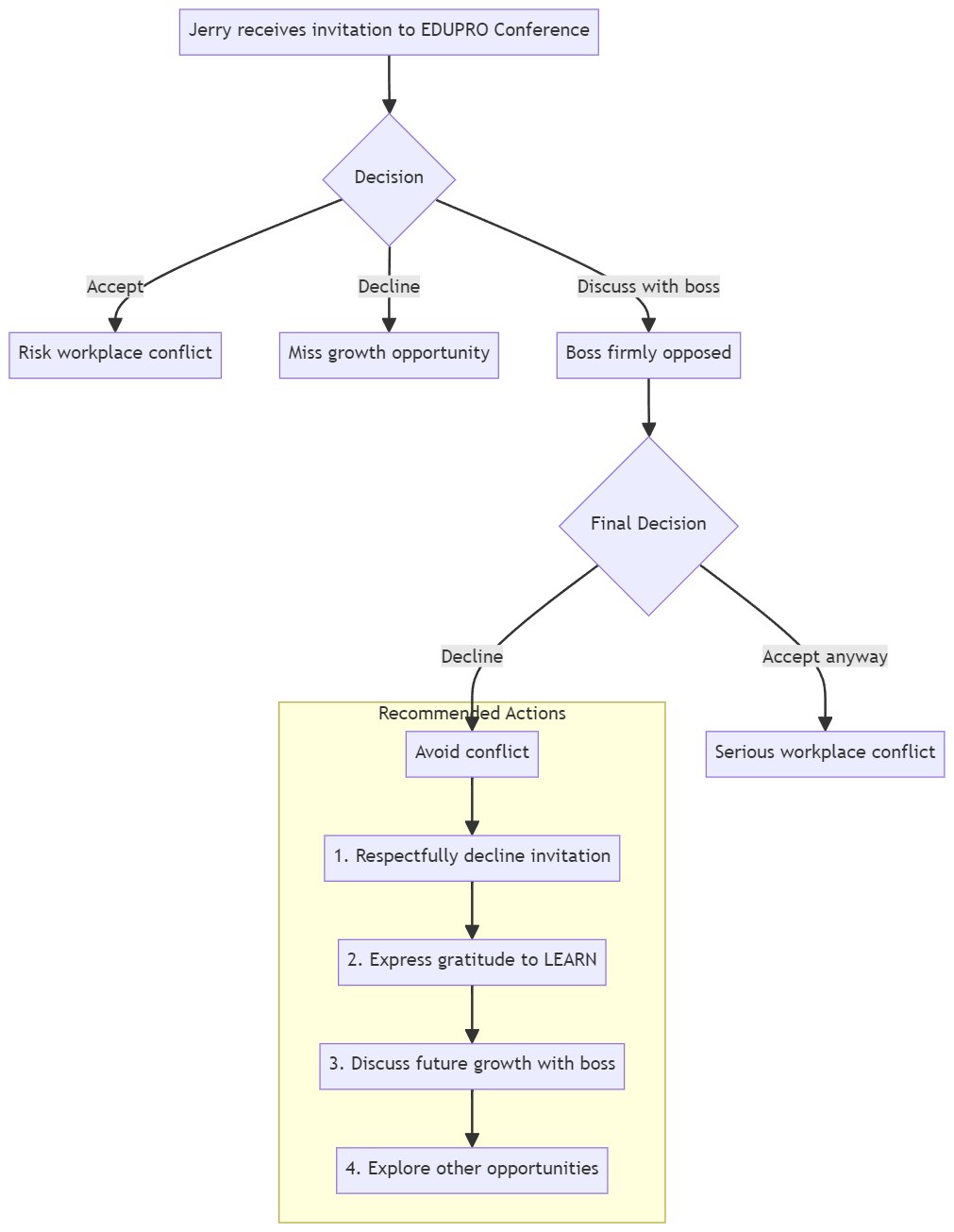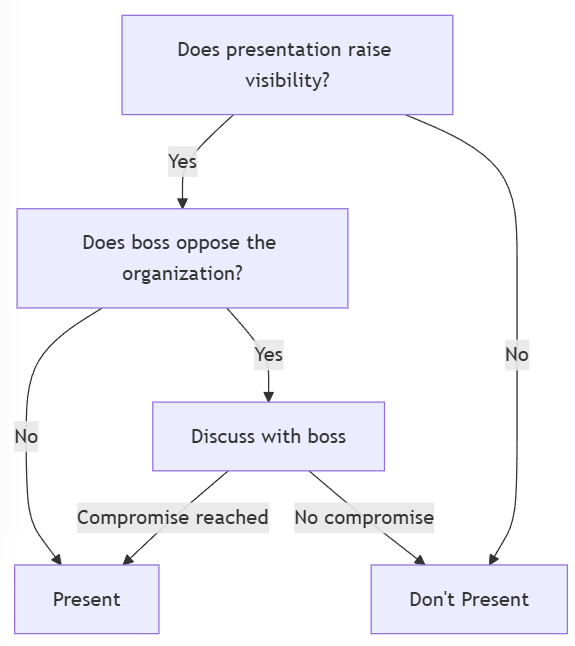ETHICAL: Jerry's Quandary #ETHICAL
Ok, so I’m ready to apply ETHICAL decision-making framework to a real life situation. Ready to see ETHICAL in action? Me, too.

Situation
A friend of mine has approached me with a situation and wants my advice. Given my coaching background and training, I know that “Advice is toxic.” So, my goal is to clarify the situation as best as I can, asking questions. However, one possibility that I have encountered with this approach is “getting lost in the weeds.” In other words, you wander around every option so much that every outcome ends up with an equal weight. That just won’t do.
So, here’s an explanation of the decision challenge my colleague is facing:> Jerry, a respected educator, finds himself in a professional dilemma. He has received an invitation to speak at the EDUPRO Conference, an event organized by LEARN, a professional organization dedicated to advancing education in their state. LEARN is affiliated with a larger parent organization, EDUCATE.The invitation reads:
Dear Jerry,
We are reaching out to express our interest in having you as a potential speaker at our upcoming EDUPRO Conference. This year’s theme is ‘Innovating Education for Tomorrow’s Leaders,’ and we are seeking speakers who can inspire and motivate our attendees while sharing insights on the latest trends and best practices in education.
Your experience in the field of education is highly respected, and your passion for helping students learn is evident in your work. We believe you would be an ideal featured speaker, capable of bridging the gap between the needs of education professionals and practical applications within professional learning. We would be honored to have you consider this opportunity." Jerry is tempted by this invitation. He feels that speaking at the conference could be a great opportunity to share his knowledge, network with other professionals, and potentially advance his career. The conference theme aligns well with his expertise, and he believes he could deliver a compelling presentation.
However, there’s a significant complication. Jerry’s boss is opposed to their organization’s involvement with LEARN, the group organizing the event. The reasons for this opposition are unclear to Jerry, but he knows it’s a firmly held stance.Now, Jerry faces a difficult decision:
- Accept the invitation and speak at the conference, potentially advancing his career but risking conflict with his boss.
- Decline the invitation to avoid any workplace tension, but miss out on a valuable professional opportunity.
- Attempt to discuss the matter with his boss to understand the reasons for the opposition and potentially negotiate a compromise.
- Seek advice from trusted colleagues or mentors on how to navigate this situation.
Jerry is worried about the potential consequences of accepting the invitation, but he’s also reluctant to pass up such a promising opportunity. He needs to carefully weigh the potential benefits against the risks and consider the best course of action for his professional future and current workplace relationships.
What would you advise Jerry to do in this situation?
A Decision Tree
This is really a straightforward problem, right? Or is it? Consider this decision tree:

To be blunt, Jerry’s concern that a discussion with the boss would be problematic given the boss' history with other employees is well-taken. Why put himself at risk in this situation for a small time payout? If the boss has shown himself inflexible in regards to the EDUCATE parent organization, Jerry would have a snowball’s chance in heck to get approval to present.
I can already hear some of you saying, “Jerry should quit!” And, I agree with you. No one should have to work with an employer like that. But let’s give Jerry the benefit of the doubt. Maybe he has a mortgage, three or four young kids, and the job is more important than presenting for a one-time payment and the hope of future payoff in prestige and reputation. His good work has gotten him noticed, maybe that will continue into the future.I wonder if ETHICAL can bring some clarity to this decision.
An ETHICAL Decision Process
Let’s use the prompt for an ETHICAL situation. It’s essentially the prompt I shared yesterday plus the situation above:
Complete Prompt
I need to analyze a decision-making situation using the ETHICAL model. Please help me break down the scenario using the following structure:
- Engage stakeholders: Who are the key parties involved or affected by this decision?
- Think emotionally and logically: What are the intuitive feelings and logical considerations about this situation?
- Harmonize perspectives: How can we integrate diverse viewpoints on this issue?
- Investigate options: What are the main alternatives, and how do they compare?
- Collaborate on recommendations: What solutions can we propose together?
- Authorize decision: Who has the final say, and what is their decision based on our analysis?
- Launch implementation: How will we execute this decision and monitor its effects?
Please provide a brief analysis for each step of the ETHICAL model, considering the specific context and challenges of the situation. Conclude with a summary of the recommended course of action and any potential obstacles to implementation.
The situation I need to analyze using the ETHICAL model is as follows: Jerry, a respected educator, finds himself in a professional dilemma. He has received an invitation to speak at the EDUPRO Conference, an event organized by LEARN, a professional organization dedicated to advancing education in their state. LEARN is affiliated with a larger parent organization, EDUCATE.The invitation reads:
“Dear Jerry,
We are reaching out to express our interest in having you as a potential speaker at our upcoming EDUPRO Conference. This year’s theme is ‘Innovating Education for Tomorrow’s Leaders,’ and we are seeking speakers who can inspire and motivate our attendees while sharing insights on the latest trends and best practices in education.Your experience in the field of education is highly respected, and your passion for helping students learn is evident in your work.
We believe you would be an ideal featured speaker, capable of bridging the gap between the needs of education professionals and practical applications within professional learning.We would be honored to have you consider this opportunity.”
Jerry is tempted by this invitation. He feels that speaking at the conference could be a great opportunity to share his knowledge, network with other professionals, and potentially advance his career.
The conference theme aligns well with his expertise, and he believes he could deliver a compelling presentation.However, there’s a significant complication. Jerry’s boss is opposed to their organization’s involvement with LEARN, the group organizing the event. The reasons for this opposition are unclear to Jerry, but he knows it’s a firmly held stance.Now, Jerry faces a difficult decision:
- Accept the invitation and speak at the conference, potentially advancing his career but risking conflict with his boss.
- Decline the invitation to avoid any workplace tension, but miss out on a valuable professional opportunity.
- Attempt to discuss the matter with his boss to understand the reasons for the opposition and potentially negotiate a compromise.
- Seek advice from trusted colleagues or mentors on how to navigate this situation.
Jerry is worried about the potential consequences of accepting the invitation, but he’s also reluctant to pass up such a promising opportunity. He needs to carefully weigh the potential benefits against the risks and consider the best course of action for his professional future and current workplace relationships.
What would you advise Jerry to do in this situation?
The Results
So, the recommended course of action is:
Given the firm opposition from Jerry’s boss and the lack of compromise, the recommended course of action is for Jerry to decline the invitation to speak at the EDUPRO Conference. This decision prioritizes maintaining a positive relationship with his current employer while avoiding potential serious consequences to his job.
Potential obstacles in implementing this decision include:
- Jerry’s disappointment and potential frustration with the limitations placed on his professional growth
- The challenge of finding equally valuable opportunities for career advancement within the constraints of his current job- The need to navigate future invitations or opportunities that may conflict with his boss’s preferences
By carefully handling this situation, Jerry can maintain his professional integrity, respect his employer’s position, and focus on finding alternative paths for career growth that align with both his aspirations and his workplace expectations